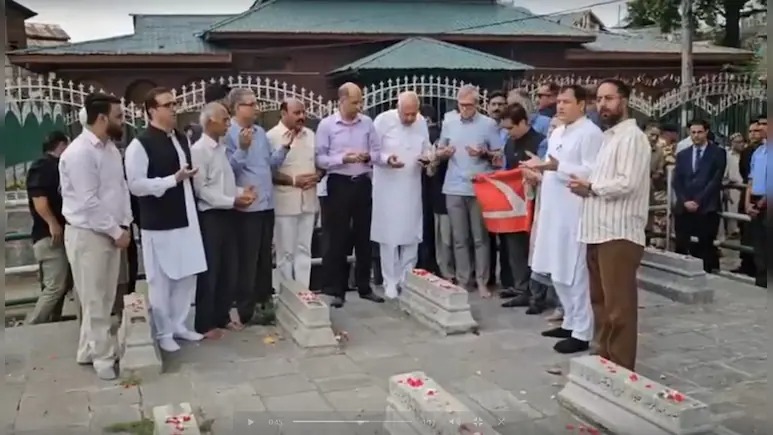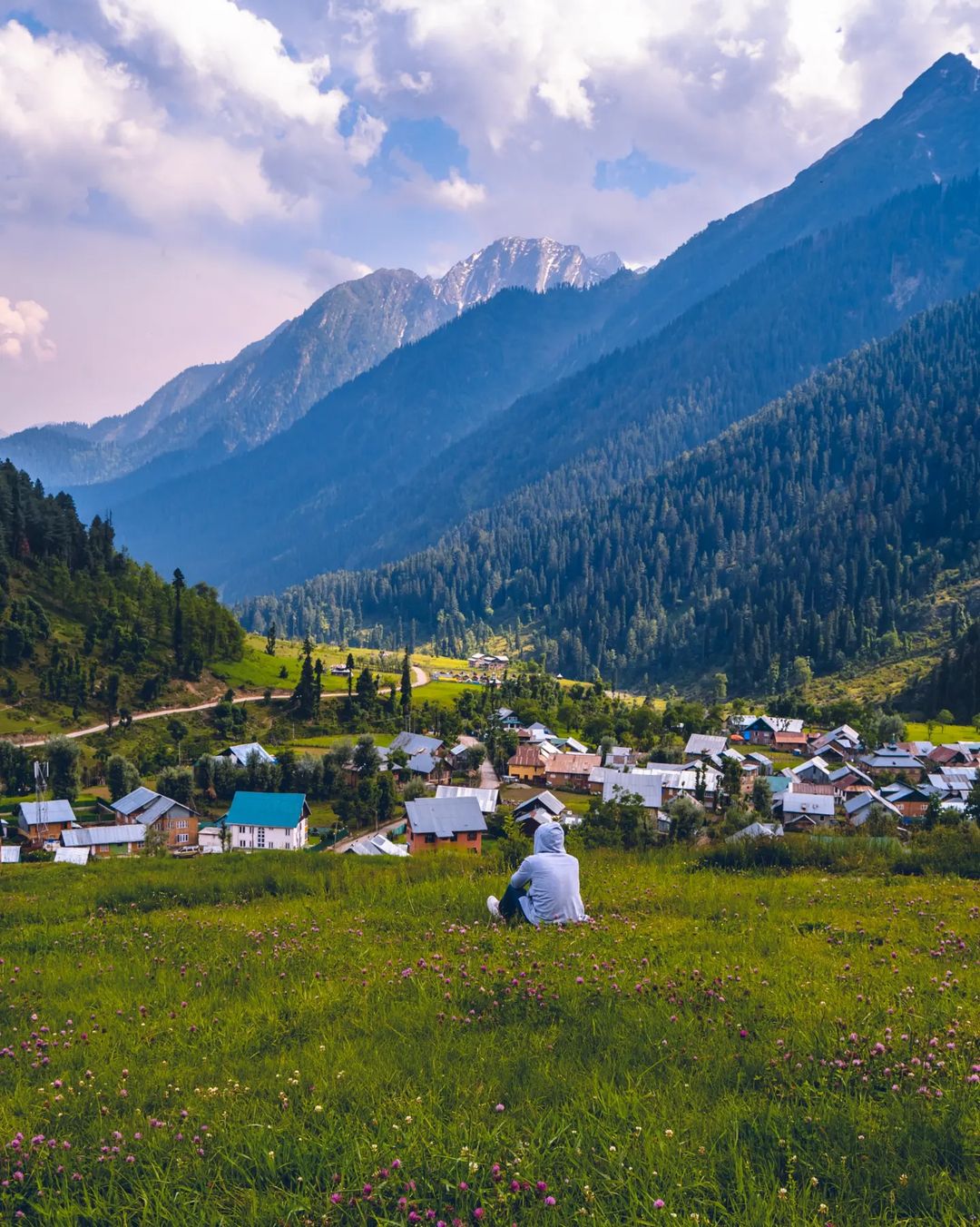Omar Abdullah Condemns July 14 Incident in Srinagar as a Blow to Democracy in Jammu & Kashmir
By: Javid Amin | Srinagar | 21 July 2025
Democracy at a Crossroads in Jammu & Kashmir
On July 14, 2025, an incident unfolded at the Martyrs’ Graveyard in Srinagar that many, including National Conference (NC) leader and former Chief Minister Omar Abdullah, are calling a dark day for democracy in Jammu & Kashmir. What was meant to be a solemn tribute to the martyrs of 1931 turned into a scene of confrontation between elected leaders and law enforcement authorities.
In a strongly worded condemnation, Omar Abdullah labelled the event “shameful” and declared it a serious blow to democratic institutions in the region. His statements have since ignited a fierce political debate—about not only the treatment of opposition leaders but the larger state of democracy in the Union Territory of Jammu & Kashmir.
This article dives deep into the incident, explores its historical and political relevance, analyzes reactions from across the spectrum, and outlines the broader consequences for democratic governance in one of India’s most sensitive and scrutinized regions.
The July 14 Incident: What Happened at the Martyrs’ Graveyard
Location: Martyrs’ Graveyard, Naqshband Sahib, Srinagar
The Martyrs’ Graveyard is a site of profound historical and emotional significance for Kashmiris. It houses the graves of the 22 civilians killed on July 13, 1931, during protests against the Dogra monarchy. Every year, political leaders, activists, and citizens gather here to offer tributes—a practice rooted in Kashmir’s collective memory.
Who Was Involved:
-
Omar Abdullah (former CM and NC leader)
-
Senior leaders of the National Conference
-
Jammu & Kashmir Police personnel
What Transpired:
According to reports and eyewitness accounts, police personnel prevented NC leaders from reaching the site, resulting in heated arguments and what Omar Abdullah later described as “manhandling.” Video footage allegedly shows physical confrontation, though authorities have downplayed the altercation as a “miscommunication.”
Omar Abdullah’s Statement: Not Just Personal, But Institutional
In a press conference later that day, Abdullah did not merely voice personal indignation. Instead, he emphasized that the incident undermined democratic institutions and sent a dangerous message to the public.
Key Quotes:
“This is not about Omar Abdullah being stopped. It’s about the dignity of an elected office being disrespected in full public view.”
“If an elected former Chief Minister is treated this way, what hope is there for the ordinary voter?”
“This dual governance system is not ideal for democracy. It creates confusion, diffuses accountability, and encourages impunity.”
Abdullah’s words weren’t just politically charged—they reflected a deeper concern about growing democratic deficits in Jammu & Kashmir since its reorganization into a Union Territory in 2019.
Erosion of Trust in Electoral Institutions: A Ticking Time Bomb?
One of the most alarming observations from Abdullah’s statement was his concern about the impact of such incidents on public trust in democracy.
Growing Voter Disillusionment:
In a region where voter turnout already fluctuates due to historical alienation and security concerns, such state behavior risks deepening public cynicism. Abdullah’s warning resonates beyond party politics—it touches the core of India’s democratic experiment in Kashmir.
Context:
-
2019: Article 370 abrogated, statehood revoked.
-
2020–2024: Delimitation exercise seen as controversial.
-
2025: Local body elections postponed multiple times; political outreach remains fragile.
If voters see leaders being obstructed and disrespected, they may withdraw further from the political process, leading to dangerously low participation in future elections.
Governance Under Scrutiny: The ‘Dual Power’ Dilemma
Omar Abdullah also criticized the current dual governance model, where administrative power is concentrated in the hands of the Lieutenant Governor (LG) appointed by the Centre, while elected representatives remain sidelined.
The Centre-State Tug-of-War:
Since J&K’s conversion into a Union Territory:
-
Law & Order is governed directly from Delhi.
-
Political decisions often lack local consultation.
-
Civil liberties are frequently curtailed in the name of “security.”
Abdullah described this as “confused federalism”, arguing that:
-
It dilutes accountability.
-
It enables excesses, like police high-handedness.
-
It disrespects the federal structure enshrined in the Constitution.
The Historical Legacy of July 13, 1931: Why It Matters
A Brief Flashback:
The 1931 protests were a turning point in Kashmiri resistance against the autocratic Dogra regime. Those who died on July 13 were seen as martyrs of civil liberty, and their sacrifice eventually helped shape the region’s political awakening.
The Irony Today:
That very site, once symbolic of the fight against tyranny, was on July 14, 2025, turned into a battleground between democratic expression and state control. Omar Abdullah’s visit was not a rally, not a protest—it was a tribute. Yet it was met with police resistance.
Political Hypocrisy?
Abdullah also called out the BJP, saying the ruling party had previously commemorated similar events for political mileage, but now opposes remembrance when led by rival parties.
“When it suits them, they quote history. When it challenges them, they erase it.”
Reactions Across the Political Spectrum
National Conference (NC):
-
Called it a “state-sponsored insult” to democracy.
-
Demanded an apology and explanation from the LG administration.
-
Pledged to raise the issue in Parliament and international forums.
Bharatiya Janata Party (BJP):
-
Dismissed Abdullah’s reaction as “drama.”
-
Justified police action on the grounds of “security.”
-
Accused NC of “using martyrs for political stunts.”
Congress & Other Opposition:
-
Expressed solidarity but remained cautious in direct criticism.
-
Some leaders echoed concerns about “shrinking democratic space.”
Civil Society & Media:
-
Human rights groups questioned the policing of remembrance.
-
Editorials in national dailies raised alarms about abuse of executive power.
-
Social media erupted with hashtags like #DemocracyUnderAttack and #RespectMartyrs.
Implications Beyond Srinagar: Why India Should Care
What happened on July 14 isn’t just a “Kashmir story.” It reflects broader concerns about India’s democratic health, especially in regions where Centre-state relations are fraught.
Key Questions Raised:
-
Can elected leaders operate freely in Union Territories?
-
Are remembrance and public history being weaponized?
-
Is dissent still tolerated in India’s federal framework?
When regional leaders are disrespected or obstructed in performing symbolic gestures of tribute, it sets a precedent—one that could normalize institutional disrespect across states.
Omar’s Broader Message: Democracy Must Be Felt, Not Just Preached
Philosophy of Participation:
Abdullah’s core message wasn’t about personal ego or party politics. It was about ensuring citizens feel heard and represented. He reiterated that symbolic acts like visiting a graveyard are part of that emotional democracy.
“You cannot inspire people to vote, to believe in the Constitution, if you show them that elected leaders don’t matter.”
What Needs to Happen Now: A Roadmap for Restoring Trust
01. Public Apology from Administration
A formal acknowledgment of the mistake would go a long way toward rebuilding trust.
02. Clarification on Police Protocols
Why were leaders blocked? Under what law? These questions must be answered in the public domain.
03. Reform of Centre-UT Relations
J&K needs a governance model that respects local leadership and constitutional values.
04. Honest National Dialogue on Kashmir
Instead of managing Kashmir as a security problem, India must approach it as a democratic and developmental opportunity.
Bottom-Line: July 14, 2025—A Date That Must Not Be Forgotten
Omar Abdullah’s statement is more than a political grievance—it is a call to conscience. The events at the Martyrs’ Graveyard on July 14 challenge India to look in the mirror. Are we the democracy we claim to be? Or are we inching toward authoritarian tendencies wrapped in the language of national security?
For Kashmir, where wounds of distrust run deep, every symbolic slight adds to the fracture. The best tribute to the 1931 martyrs would be to protect the democracy they died fighting for—not police it.



